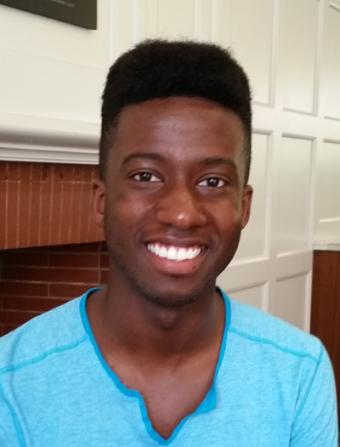“When I told my parents that I wanted to do applied math/biology, Nwizu said, “they were like, ‘Why are you choosing this field to study?’ I really didn’t have a good answer for them. I just said I really love math and I really love biology. I just have a feeling this is going to come into play later in my career.”
Now Nwizu has that answer: He’s developing a model of the spread of drug-resistant malaria in Southeast Asia with adviser Daniel Weinreich, associate professor of ecology and evolutionary biology. That could help predict the effects of an unorthodox epidemiological strategy in which malaria helps to fight malaria. Drug-resistant malaria strains would likely lose out when pitted head-to-head against the non-resistant “wild-type” strains.
“Based on this assumption, we are looking for ways to administer the drug therapy, Artemisinin, to maximize the exposure of the drug-sensitive malaria parasites to the treatment while minimizing the exposure of the drug-resistant malaria parasites to the treatment,” he said. “We are trying to control the sensitive malarial strain with the drug and control the resistant malarial strain with the sensitive malarial strain.”
It’s not easy to do mathematical epidemiology research, Nwizu notes. He can’t test his ideas in a lab to learn from a concrete result. The answers he has needed lie in books and journals. He’s been hitting those hard to learn new math along the way, such as partial differential equations, sometimes working until midnight.
Another challenge of the project is writing a computer program to produce a visual simulation. Different colored dots within a vast grid will show who’s getting malaria, which version of it, and who is lucky enough to either be immune or cured.
Nwizu said he’s been enjoying the work. That’s a good thing because he planned his summer around it.
“I really didn’t have a plan B,” he said. “It was apply to research programs or bust.”
That singular focus derives from a specific career goal of helping whole populations of people become and stay healthy.
“It has been fun,” said Nwizu, who is in Brown’s Program in Liberal Medical Education. “It goes into what I want to do as a career. I want to get an M.D./Ph.D. and eventually work for the [Centers for Disease Control and Prevention]. Modeling a disease is something that I could see myself doing every day, day in and day out. It’s very, very rewarding.”

